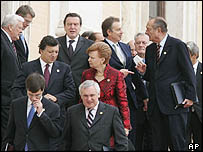
European leaders remain divided over the EU's strategy
|
European Union leaders are gathering in Brussels on Thursday for a two-day summit, with EU economic reform high on the agenda.
They will approve the next steps in a strategy aimed at helping Europe catch up with the US as the world's most dynamic economy.
But a report prepared in advance says they are failing to deliver on pledges.
The summit will also cover measures to help stabilise Iraq and EU efforts to coordinate immigration policy.
The EU's painful internal split over the Iraq war and its aftermath is still obvious, the BBC's William Horsley in Brussels reports.
When Iraq's interim Prime Minister Iyad Allawi joins them on the second day, the leaders are to approve a modest package of measures to support his government's aims.
The EU is to set up a training scheme for Iraqi police, lawyers and election officers, and hold out the prospect of a formal Iraq-EU agreement on trade and other matters.
But the impact of these things will depend on improved security on the ground, which is not the EU's direct concern.
EU-US competition
The leaders' main business in Brussels is to approve the next steps in the economic reform strategy to help Europe catch up with the US as the world's most dynamic economy by 2010.
But the report prepared in advance by former Dutch Prime Minister Wim Kok says plainly that the strategy is not working, because some EU governments have not been willing to take their reform medicine.
The leaders will also approve an ambitious long-term plan to harmonise many aspects of asylum and immigration policy, as well as cross-border law enforcement across the EU.
But key parts of the plan are not yet agreed, including controversial ideas for preventing would-be migrants to Europe from entering illegally. These include finding ways of processing their bids for asylum or for work permits in some countries in North Africa and other transit regions.
Losing ground
Mr Kok's report recommends, among other things, that an annual list should be published showing which countries are failing to do enough to rejuvenate their economies.
"We have to focus very much on growth and employment and make that the top priority of the EU in the years to come," Mr Kok told the BBC's World Business Report.
The EU economy had "lost ground" to the US and Asia in recent years, he said.
"On the whole, even if every target could be met by 2010, it would be highly improbable to expect that we would be the strongest economy in the world," he said.
Mr Kok praised Nordic governments for the way they were running their economies, but he said other EU member states "had not delivered enough".
The so-called Lisbon Agenda called on EU governments to implement a range of economic and social changes, including tax cuts, reform of heath care and pension systems, and making it easier for companies to hire and fire workers.
The EU's economic growth is projected to be 2% in 2004 and 2.4% in 2005 - roughly half the global growth rates for those two years.
